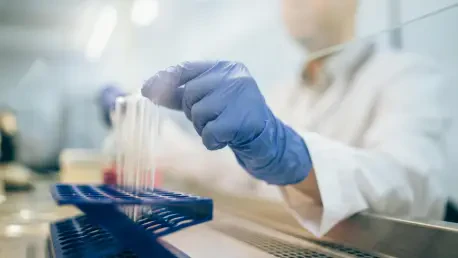The biomanufacturing industry is witnessing a significant shift as innovative microcarrier technologies emerge, promising to alter the conventional methods of cell-based production. At the forefront of this transformation is the collaboration between Smart MCs and the University of New South Wales (UNSW), which recently received a substantial $900,000 Linkage Grant from the Australian Research Council (ARC). These innovative microcarriers aim to overcome traditional limitations, making biomanufacturing processes more efficient and reliable. The integration of these advanced microcarriers is poised to meet the growing demand for scalable and cost-effective solutions in fields such as vaccine and stem cell production, where quality and efficiency are paramount.
Smart MCs, renowned for its proficiency in microcarrier materials, is working with UNSW’s expert research team to refine this technology. The project’s primary goal is to develop xeno-free microcarriers that offer enhanced scalability while reducing production costs and improving product quality. The significance of this advancement cannot be overstated as it addresses one of the industry’s most pressing challenges: the inefficiencies associated with conventional non-dissolvable microcarriers. By focusing on factors such as stiffness, size, and surface charge, this initiative seeks to offer a customized approach that suits the diverse needs of different cell types, a necessity in modern advanced therapy and viral vector manufacturing.
Achieving Scalable Solutions
The development of scalable biomanufacturing solutions is crucial as global demand for biopharmaceuticals continues to soar. Traditional microcarrier methods often face limitations that make them less suited for large-scale applications. These limitations include difficulties in cell harvesting and expansion, which can lead to inefficient production processes, increased costs, and reduced quality of the end products. By collaborating with UNSW, Smart MCs is not only seeking to address these challenges but also paving the way for more adaptable solutions tailored to specific cell types. This adaptability is important as it allows for continuous improvement and optimization of the manufacturing process based on the particular requirements of the cells being used.
The emphasis on process development in bioreactor cultures is another cornerstone of this project. Reducing cell loss during scaling is an area of focus, aiming to maximize yield while maintaining quality. Bioreactors equipped with the new microcarrier technology are being engineered to accommodate diverse cell lines, ensuring their viability and growth on a commercial scale. Through a strategic approach that combines material science with biotechnology, the initiative is expected to herald a new era of efficiency in biomanufacturing. This innovation not only speaks to the current needs of the industry but also sets a precedent for future technological advancements in the field.
Addressing Industry Challenges
Tackling the inefficiencies of conventional microcarriers is a multifaceted endeavor that involves both material innovation and process optimization. Non-dissolvable microcarriers, while widespread, frequently present challenges in maintaining cell health and viability during scale-up. A generic approach to microcarriers can often fall short, given the variety of cell types involved in different biomanufacturing applications. By customizing microcarriers to the specific requirements of each cell type, ranging from mesenchymal stem cells to producer cell lines for viral vaccines, the project aims to improve performance and scalability. This customization not only reduces production costs but also enhances the overall quality of the cultured cells, which is especially important in therapeutic applications.
The partnership between Smart MCs and UNSW is emblematic of Australia’s broader aspirations to strengthen its presence in the global biotechnology landscape. Despite not being a conventional pharmaceutical hub, Australia has demonstrated potential through strategic research and development investments, as evidenced by notable successes such as CSL. By aligning academic research with industry demands through the ARC’s Linkage Program, the initiative seeks to address real-world challenges in biomanufacturing. This collaborative approach not only fosters innovation but also ensures that new solutions are relevant and effective in practical applications.
A Path Forward for Biomanufacturing
With substantial funding backing this initiative, the project is well-positioned to make noteworthy contributions to the field of biomanufacturing. The support will facilitate the involvement of postgraduates, PhD students, and postdoctoral researchers, ensuring a robust research environment. This is complemented by providing vital materials necessary for experimentation and prototyping, which are essential components in refining microcarrier technology. Smart MCs’ CEO, Payar Radfar, highlights the pivotal role of high-performance microcarrier solutions in advancing Australia’s biomanufacturing capabilities, underscoring the transformative potential of this project.
The implications extend beyond the scope of immediate applications, as this initiative sets the stage for long-term impacts on the biotechnology sector. By redefining what is possible with microcarrier technology, the collaboration between Smart MCs and UNSW exemplifies a concerted effort to drive innovation through research and development. This partnership not only enhances Australia’s biomanufacturing landscape but also reinforces its commitment to addressing complex industry challenges through strategic collaborations. As the project progresses, it promises to unlock new avenues for growth and efficiency in biomanufacturing, with potential benefits that could resonate globally.
Paving the Future of Efficiency
The biomanufacturing industry is experiencing a transformative shift thanks to groundbreaking microcarrier technologies that promise to revolutionize traditional cell-based production methods. Leading this change is a partnership between Smart MCs and the University of New South Wales (UNSW), which secured a $900,000 Linkage Grant from the Australian Research Council (ARC). These advanced microcarriers aim to address longstanding limitations by making biomanufacturing processes more efficient and dependable. Their incorporation is crucial in fields like vaccine and stem cell production, where scalability, cost-effectiveness, quality, and efficiency are critical.
Smart MCs, a leader in microcarrier materials, collaborates with UNSW’s expert research team to enhance this technology. The main objective is to create xeno-free microcarriers that improve scalability, minimize production costs, and enhance product quality. This development tackles a key industry challenge: the inefficiencies of traditional non-dissolvable microcarriers. By optimizing factors such as stiffness, size, and surface charge, the initiative offers tailored solutions for diverse cell types, essential for modern advanced therapies and viral vector manufacturing.









